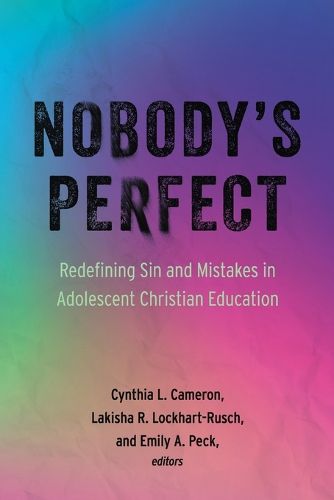Readings Newsletter
Become a Readings Member to make your shopping experience even easier.
Sign in or sign up for free!
You’re not far away from qualifying for FREE standard shipping within Australia
You’ve qualified for FREE standard shipping within Australia
The cart is loading…






Adolescents, like everyone else, make mistakes. However, religious educators Cynthia L. Cameron, Lakisha R. Lockhart-Rusch, and Emily A. Peck argue that some youths are born with the privilege of making mistakes in ways that others often are not. They also argue that many Christian education practices that guide our understandings of mistake-making are shaped by gender and gender identity, sexual orientation, and race in ways that disenfranchise some adolescents.
In response, Cameron, Lockhart-Rusch, and Peck curate a much-needed conversation that helps religious educators accompany adolescents and better understand mistakes based on a theological framework that names adolescents as fundamentally good. The result is an edited volume that explores ways educators can walk with adolescents so that youth can learn from their mistakes and grow without misunderstanding all mistakes as sin. Together, these essays seed a theology of adolescent goodness that's rooted in a liberative Christian theological anthropology.
Drawing on both qualitative and quantitative research, Nobody's Perfect offers nuanced and robust definitions of what a mistake is, apart from definitions of sin. The book also explores the challenges of talking about mistake-making and sin with adolescents within religious institutional contexts that shape policy, pastoral practice, and ministry orientations. Finally, the book presents youths' own voices about how they understand and process what mistake-making looks like in the contexts in which they live and learn.
Nobody's Perfect is for Christian educators who serve either in the academy or in congregational settings. The book well serves educators who recognize the various cultural and developmental challenges adolescents face when their church communities. The book also offers tools to help such church leaders attend to religious education spaces with a renewed theology that can root a more liberative experience of religious education.
$9.00 standard shipping within Australia
FREE standard shipping within Australia for orders over $100.00
Express & International shipping calculated at checkout
Stock availability can be subject to change without notice. We recommend calling the shop or contacting our online team to check availability of low stock items. Please see our Shopping Online page for more details.
Adolescents, like everyone else, make mistakes. However, religious educators Cynthia L. Cameron, Lakisha R. Lockhart-Rusch, and Emily A. Peck argue that some youths are born with the privilege of making mistakes in ways that others often are not. They also argue that many Christian education practices that guide our understandings of mistake-making are shaped by gender and gender identity, sexual orientation, and race in ways that disenfranchise some adolescents.
In response, Cameron, Lockhart-Rusch, and Peck curate a much-needed conversation that helps religious educators accompany adolescents and better understand mistakes based on a theological framework that names adolescents as fundamentally good. The result is an edited volume that explores ways educators can walk with adolescents so that youth can learn from their mistakes and grow without misunderstanding all mistakes as sin. Together, these essays seed a theology of adolescent goodness that's rooted in a liberative Christian theological anthropology.
Drawing on both qualitative and quantitative research, Nobody's Perfect offers nuanced and robust definitions of what a mistake is, apart from definitions of sin. The book also explores the challenges of talking about mistake-making and sin with adolescents within religious institutional contexts that shape policy, pastoral practice, and ministry orientations. Finally, the book presents youths' own voices about how they understand and process what mistake-making looks like in the contexts in which they live and learn.
Nobody's Perfect is for Christian educators who serve either in the academy or in congregational settings. The book well serves educators who recognize the various cultural and developmental challenges adolescents face when their church communities. The book also offers tools to help such church leaders attend to religious education spaces with a renewed theology that can root a more liberative experience of religious education.